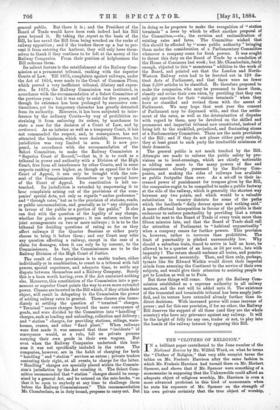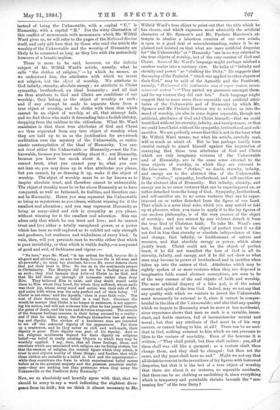THE "CLOTHES OF RELIGION."
TN a brilliant paper contributed to the June number of the National Review by Mr. Wilfrid Ward, on what he terms the "Clothes of Religion," that very able essayist turns the tables on Mr. Frederic Harrison after the same fashion in which Mr. Frederic Harrison had turned them on Mr. Herbert Spencer, and shows that if Mr. Spencer were something of a monomaniac in supposing that the Unknowable could afford an adequate object of religious worship, Mr. Harrison is even a more advanced proficient in this kind of monomania when he rests his exposure of Mr. Spencer on the strength of his own private certainty that the true object of worship,
instead of being the Unknowable, with a capital "13," is Humanity, with a capital "H," For the witty illustration of
this conflict of monomania with monomania which Mr. Wilfrid Ward gives us, we will refer to the pages of the National Review itself, and only add here that by those who read the article the
worship of the Unknowable and the worship of Humanity are likely to be connected as long as they live with the melancholy humours of a lunatic asylum.
There is more to be said, however, on the definite
subject of Mr. Wilfrid Ward's article, namely, what he calls "the clothes of religion," — by which he means, as we understand him, the attributes with which we invest not religion, but the object of worship. We attribute to God infinity, eternity, absolute energy ; we attribute to Christ
sympathy, brotherhood, an ideal humanity ; and all that we thus attribute to God and Christ are conditions of our worship ; they belong to the object of worship as such ; and if any attempt be made to separate them from a true object of worship, and to clothe with them that which cannot be an object of worship at all, that attempt fails,
and we find those who make it descending into a foolish idolatry, dropping from the sublime to the ridiculous. What Mr. Ward maintains is that these true attributes of God and Christ are thus separated from any true object of worship when they are held up to us as the justification for awe-struck meditation over the mystery of the Unknowable, or enthu- siastic contemplation of the ideal of Humanity. You can- not trust either the Unknowable or Humanity,—not the Un-
knowable, because you know nothing about it ; not Humanity, because you know too much about it. And what you cannot trust, what you cannot pray to, what you can- not lean on, you may dress up in what attributes you please, but you cannot, by so dressing it up, make it the object of worship. The 'object of worship must be so far known as to inspire absolute trust, and therefore cannot be unknowable. The object of worship must be so far above Humanity as to have conquered, as well as fathomed, its frailties, and therefore can- not be Humanity. Hence you may represent the Unknowable as being as mysterious as you please, without winning for it the smallest real adoration ; and you may represent Humanity as being as many-sided and rich in sympathy as you please, without winning for it the smallest real adoration. Man can adore only that which he can trust and love ; and he cannot trust and love either a totally unexplored power, or a power which has been so well explored as to exhibit not only strength and goodness, but weakness and wickedness of every kind. In vain, then, will you persuade man to worship either that which is pure invisibility, or that which is visible frailty,—a compound of good and evil, of feebleness and vigour :—
" No love," says Mr. Ward, "is too ardent for God, because He is all-good and all-loving ; no awe too deep, because He is all-wise and all-powerful; no trust too absolute, because He never deserts them that put their trust in Him. So too as to the sentiments proper to Christianity. The Martyrs did not die for a feeling or an idea as such ; they died because they believed Christ to be God, and that He bid them go through all torments rather than deny Him. They believed Him to exist, and that death would unite them to Him whom they loved, for whom they suffered, whose smile was their joy, whose every word and action was their rule of life, and union with whom was the only perfect end of their being. If Christ is not risen,' said the Apostle, then is your faith vain.' The root of their devotion was belief in a real fact. Convince the would-be martyr that Christ is no longer in existence, is not approv- ing his action, and will not welcome him after he has passed through the gates of death, and his love and devotion evaporate. The essence of the deepest feelings consists in their being aroused by a reality ; and if that be taken away, the feelings themselves lose all mean- ing and dignity. The clothes of a handsome man are intended to set off the essential dignity of his appearance. Put them on a scarecrow, and be they never so rich and well-made, their dignity is gone. Their dignity was part of his dignity. And so too religious sentiments depend for their dignity on religious belief—on belief in really existing Objects to which they may be worthily applied. I say, then, that all these feelings, ideas, and emotions which are associated with religion are its fitting clothes, but that the essence of religion, the central figure which they adorn, is trust in real objects worthy of these things ; and further, that while these clothes are suitable to a belief in God and the supernatural— while they constitute the form in which supernatural belief comes before us in the greatest majesty and the greatest practical useful- ness—they are nothing less than grotesque when they array the Unknowable or the Positivist deity Humanity."
Now, we so absolutely and heartily agree with that, that we should be sorry to say a word indicating the slightest diver- gence from its drift; but we think it almost necessary to Mr. Wilfrid Ward's true object to point out that the title which he has chosen, and which expresses most admirably the artificial character of Mr. Spencer's and Mr. Frederic Harrison's at- tempts to idealise a laborious creation of our own minds, is open to a good deal of misunderstanding, unless it be ex- plained and insisted on that what are mere artificial draperies for" the Unknowable" or "Humanity " are in no way external to the true objects of worship, but of the very essence of God and Christ. Some of Mr. Ward's language might perhaps mislead a careless reader into a contrary view. He talks of "infinity and eternity and power" as "clothing the Deity." He suggests that the saying of the Psalmist, "which was applied to other slayers of their God," may be said of the Agnostic and the Positivist, namely, "Diviserant sibi vestimenta mea et super ream meant milerunt sortent"—" They parted my garments amongst them, and for my vesture they did cast lots." Such language might suggest that in some sense those separable and artificial attri- butes of the Unknowable and of Humanity by which Mr. Spencer and Mr. Frederic Harrison try to subdue us into the mood of worship, are also in some degree separable, though not artificial, attributes of God and Christ himself,—that we could trust God without his eternity, infinity, and omnipotence ; or that we could love Christ without his sympathy,brotherhood, and self- sacrifice. We are perfectly aware that this is not in the least what Mr. Wilfrid Ward means, nor what his article, carefully read, will so much as admit of. But he has perhaps hardly been careful enough to guard himself against the imputation of conveying that these true attributes of God and Christ which are only imaginary vestures of the Unknowable and of Humanity, are in the same sense external to the true objects of worship, in which they are external to the false ones. Mere "clothes," no doubt, eternity, infinity, and energy are to the abstract idea of the Unknowable. Mere "clothes," sympathy, brotherhood, and self.sacrifice are to the abstract idea of Humanity. But infinity, eternity, and energy are in no sense vestures that can be superimposed on, or rather detached from the being of God. Sympathy, brotherhood, and self-sacrifice are in no sense vestures that can be super- imposed on or rather detached from the figure of our Lord. That which is a mere ideal robe, which you may unfold or fold up at pleasure, when you come to apply it to the lay figures of our modern philosophy, is of the very essence of the object of worship ; and you cannot by any violence detach it from the true God of Christian faith. To take Mr. Ward's own test. God could not be the object of perfect trust if we did not find in him that eternity or absolute independence of time and change, that infinity, or limitlessness of nature and resource, and that absolute energy or power, which alone justify trust. Christ could not be the object of perfect trust, if he did not manifest the love of God in all its eternity, infinity, and energy, and if he did not show us what man may become in power of brotherhood and in sacrifice when taken up into the nature of God. Attributes which may be rightly spoken of as mere vestures when they are disposed in imaginative folds round abstract conceptions, are seen to be of the very essence of the real objects of faith and worship. The mere artificial drapery of a false god, is of the actual essence and spirit of the true God. Indeed, may we not say that any quality with which we venture to invest the Unknowable must necessarily be external to it, since it cannot be compre- hended in the idea of the Unknowable ; and also that any quality which we impute to Humanity must be more or less accidental, since experience shows that man as such is a variable, incon- stant, and feeble creature, full of inconsistencies mental and moral ; but that any attribute of God must be of his very essence, or cannot belong to him at all P There can be no acci- dent in G-od, nothing external to him which we can presume to liken to the vesture of mortality. Even of the heavens it is written,—" They shall perish, but thou shalt endure : yea, all of them shall wax old like a garment; as a vesture shalt thou change them, and they shall be changed : but thou art the same, and thy years shall have no end." Might we not say that all idolatries consist inthe investiture of lay figures with borrowed draperies, but that it is the test of a true object of worship that there are about it no vestures, no separable accidents, that there can be no clothing or unclothing it, since everything which is temporary and perishable shrinks beneath the "con- suming fire" of the true Deity P



































 Previous page
Previous page